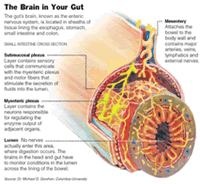|
|
Enteric Nerve Support
Remedy
 |
The enteric nervous system (ENS), often referred to as "the second brain", is a part of the peripheral nervous system and a division of the autonomic nervous system which controls the gastrointestinal tract. The ENS is embedded within the wall of the digestive tract and extends from the esophagus to the anus. Thousands of ganglia reside within the walls of these areas and the number of neurons contained in the ENS is approximately 400 million. This is more than any other peripheral organ and about the same number of neurons as the spinal cord!
The ENS has several functions which include: control of motility, regulation of fluid exchange and local blood flow, regulation of gastric and pancreatic secretion, regulation of gastrointestinal endocrine cells, defense reactions, and entero-enteric reflexes. For example, the ENS controls the external muscle coat of the gastrointestinal tract which mixes food so it is digested by enzymes. It is then absorbed by the intestinal lining and moved down the digestive tube.
The ENS also regulates the production and secretion of enteric endocrine cells. The 3 most common are: gastrin, (which is important in gastric acid secretion in the stomach); cholecystokinin, (which stimulates the secretion of pancreatic enzymes and bile); and secretin, (which stimulates secretion of bicarbonate rich fluids in the pancreas and liver). Hormones in the ENS are secreted in response to very specific stimuli and cease secretion when those stimuli are no longer present. The endocrine cells are located in the epithelium, which allows them to continuously sense and respond to changes in the gastrointestinal environment.
Fun Facts
- "Gut feelings" are a real electrochemical reaction!
- The stomach's brain is reported to play a major role in human happiness and misery.
- The stomach also is a rich source of benzodiazepines - the family of psychoactive chemicals that include the popular drugs like valium and xanax.
- The stomach contains 100 million neurons - more than the spinal cord.
- Major neurotransmitters like serotonin, dopamine, glutamate, norephinephrine and nitric oxide are in the stomach.
Health Conditions
Any digestive tract condition can potentially have nerve involvement. Some of the more common conditions include:
- Colitis, Irritable bowel syndrome, Constipation, Ulcers, Gastrointestinal reflux (GERD), Dysphagia, Chron's disease, Chagas disease, Hirschprung's Disease.
- Symptoms that may be present in newborns and infants include: Difficulty with bowel movements, Failure to pass meconium shortly after birth, Failure to pass a first stool within 24 - 48 hours after birth, Infrequent but explosive stools, Jaundice, Difficulty feeding, Low weight gain, Vomiting, Watery diarrhea (in the newborn).
Suggestions To Strengthen
- Consider food combining and adding Digestive Aid to each meal.
- Use Bowel Stimulant if not moving bowels at least once a day.
- Chew your food thoroughly (40x/bite).
- Drink plenty of water.
- Stop all stimulants, like caffeine.
- Focus on what you can do for others, not yourself. Take time to give to others.
- Consider using some Bach Flower Remedies.
|
|
| |
Nerves Enteric Support Remedy
Complete support remedy for Nerves Enteric and related functions
$14.95
|
 Add
To Cart Add
To Cart |
 |
 |
Gallbladder Support Remedy
Complete support remedy for Gallbladder and related functions
$14.95
|
 Add
To Cart Add
To Cart |
 |
 |
Brain Support Remedy
Complete support remedy for Brain and related functions
$14.95
|
 Add
To Cart Add
To Cart |
 |
 |
Large Intestine Support Remedy
Provides support and healing for conditions of the large intestine
$14.95
Read/Write Reviews
|
 Add
To Cart Add
To Cart |
 |
 |
|
|



